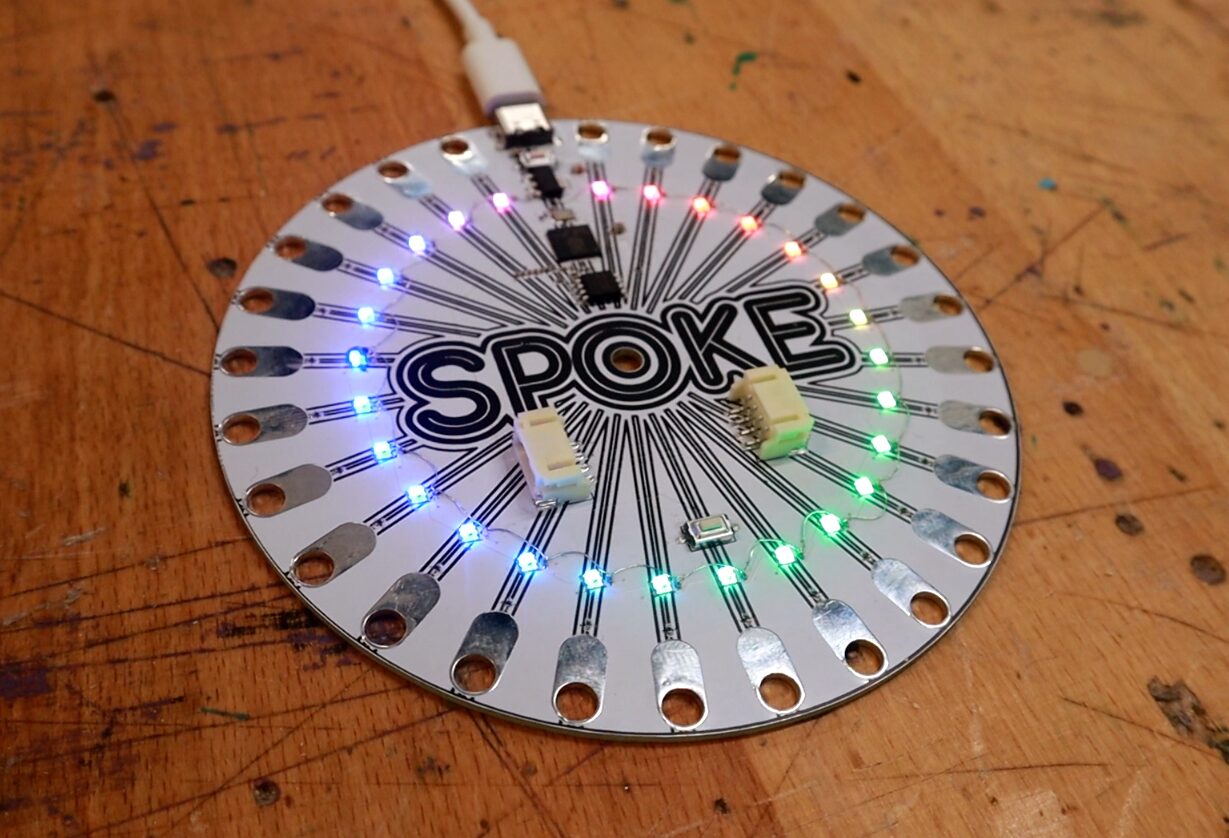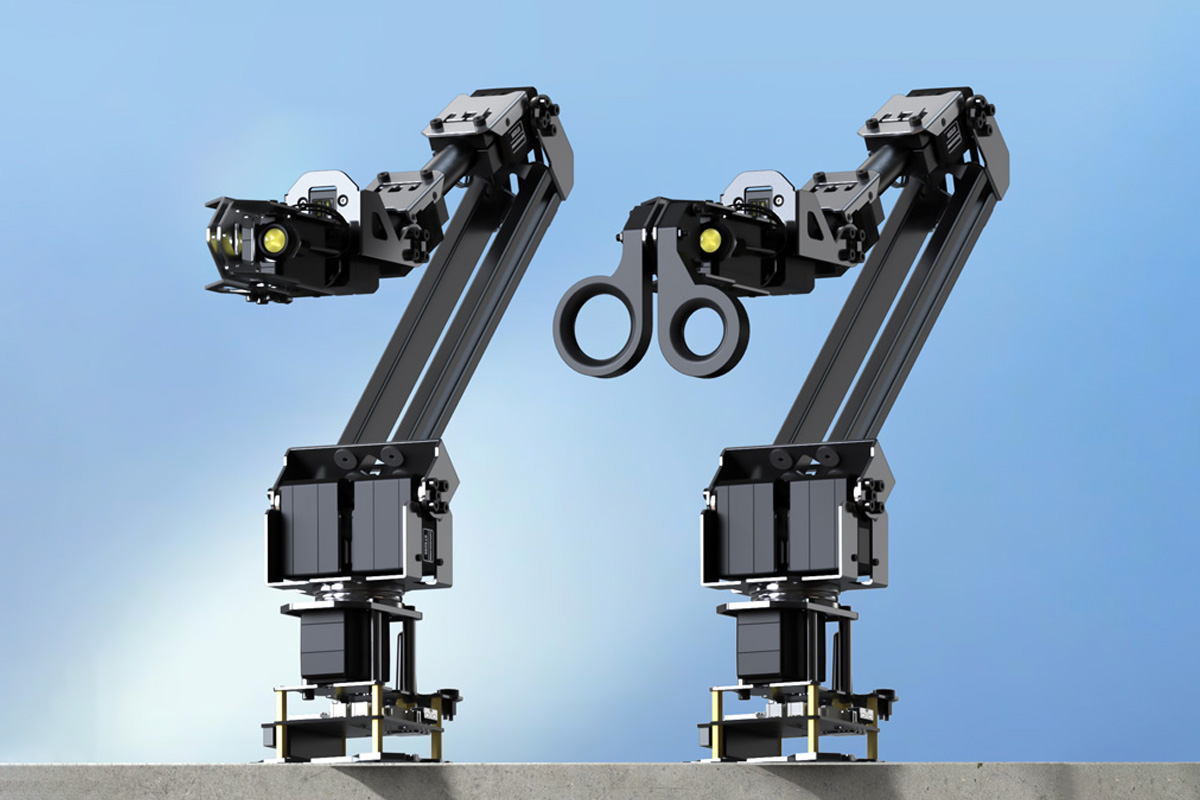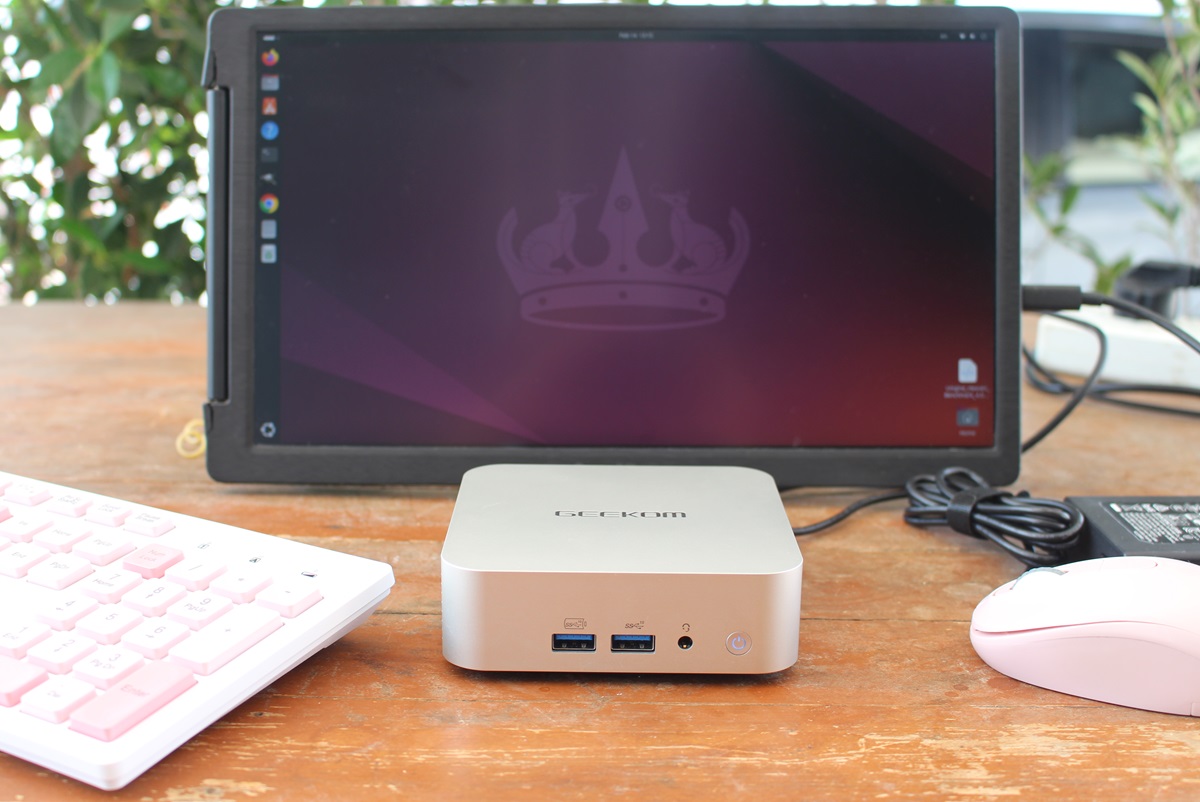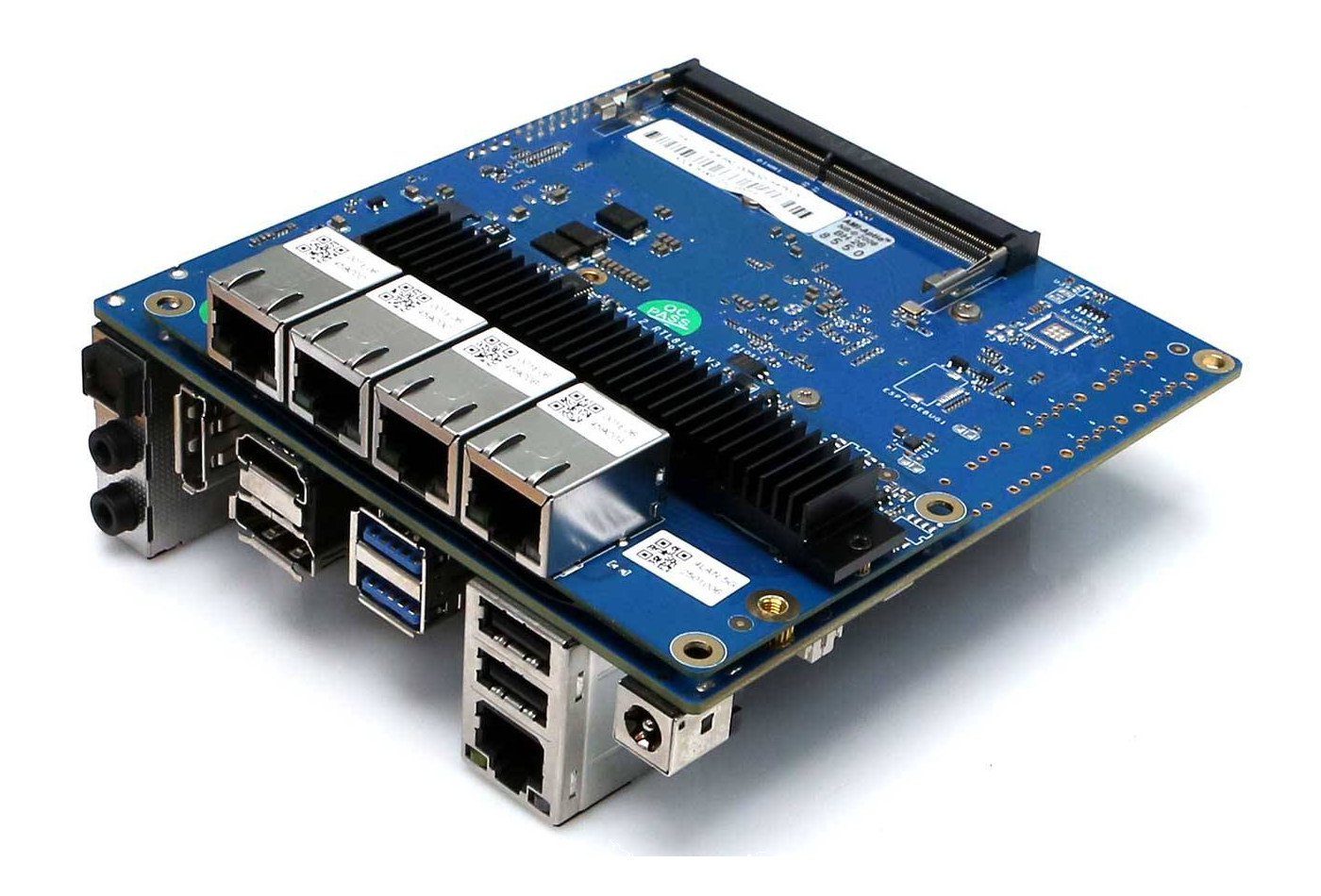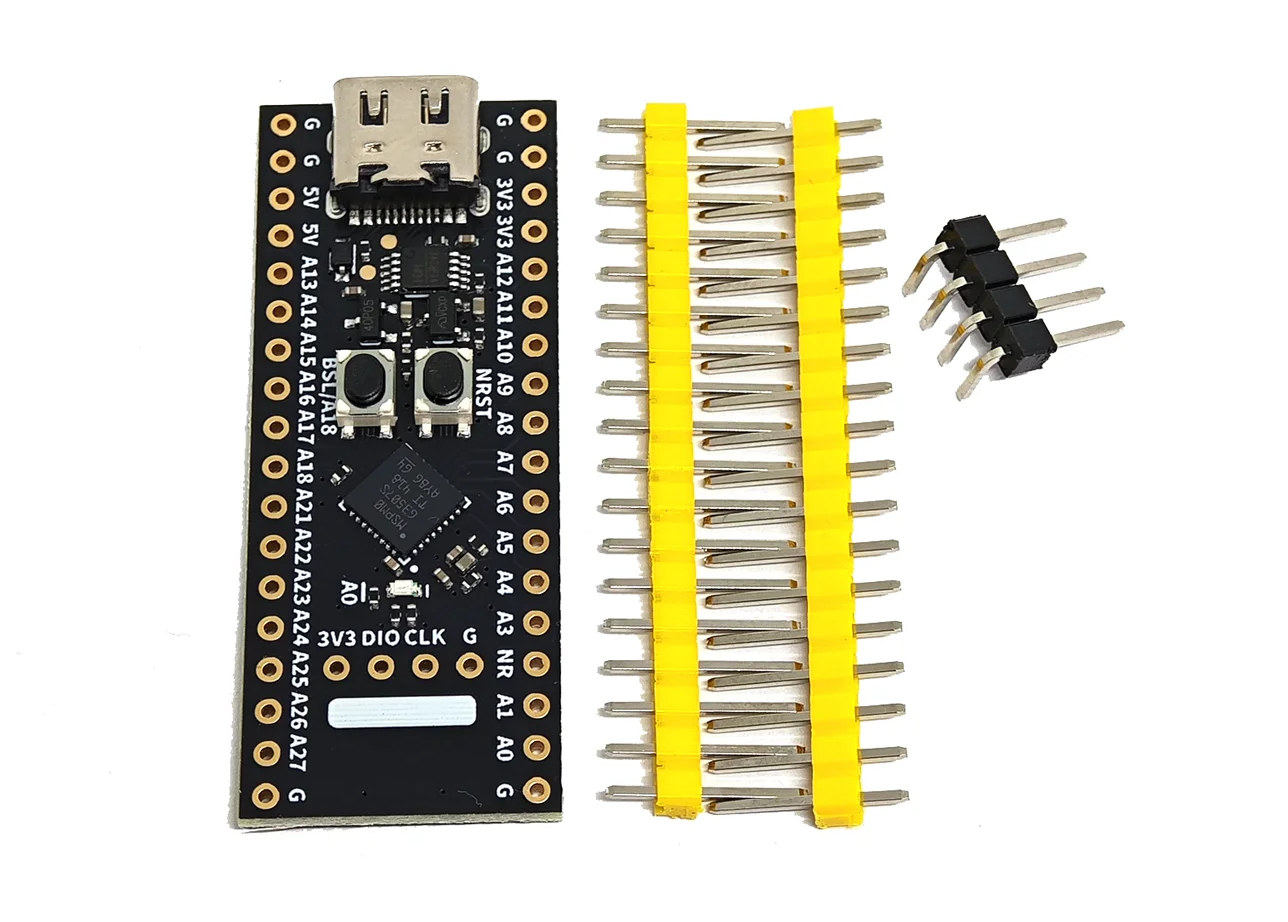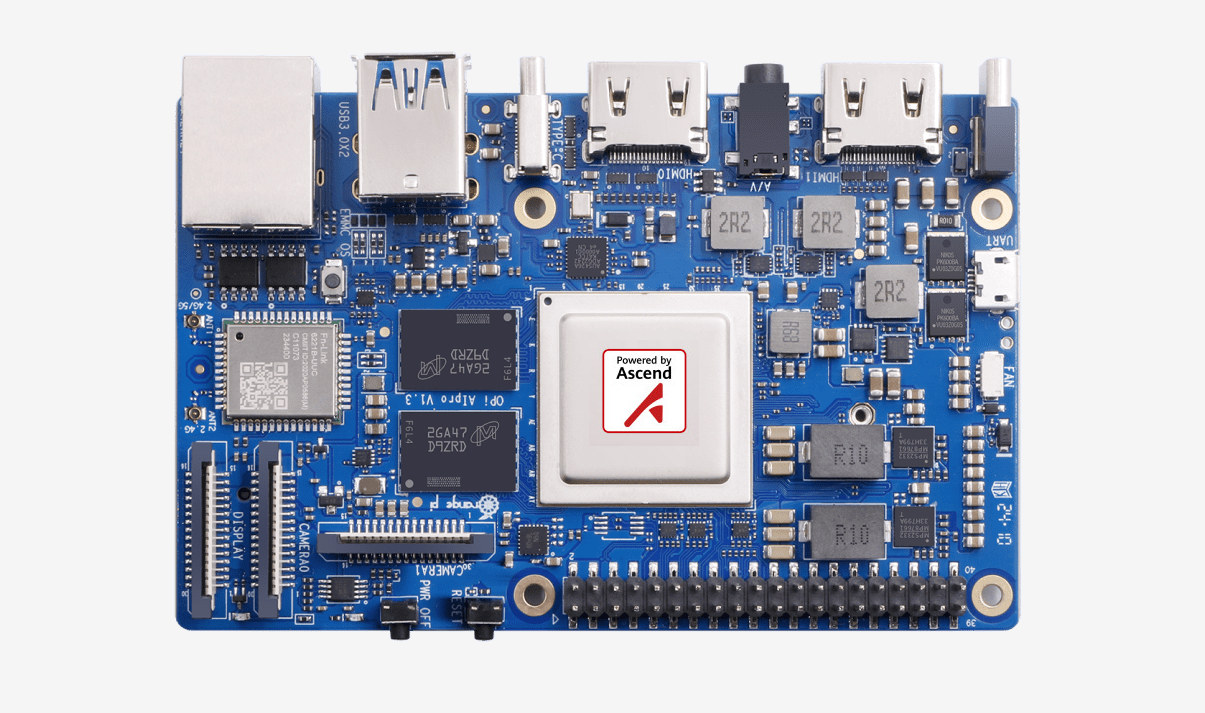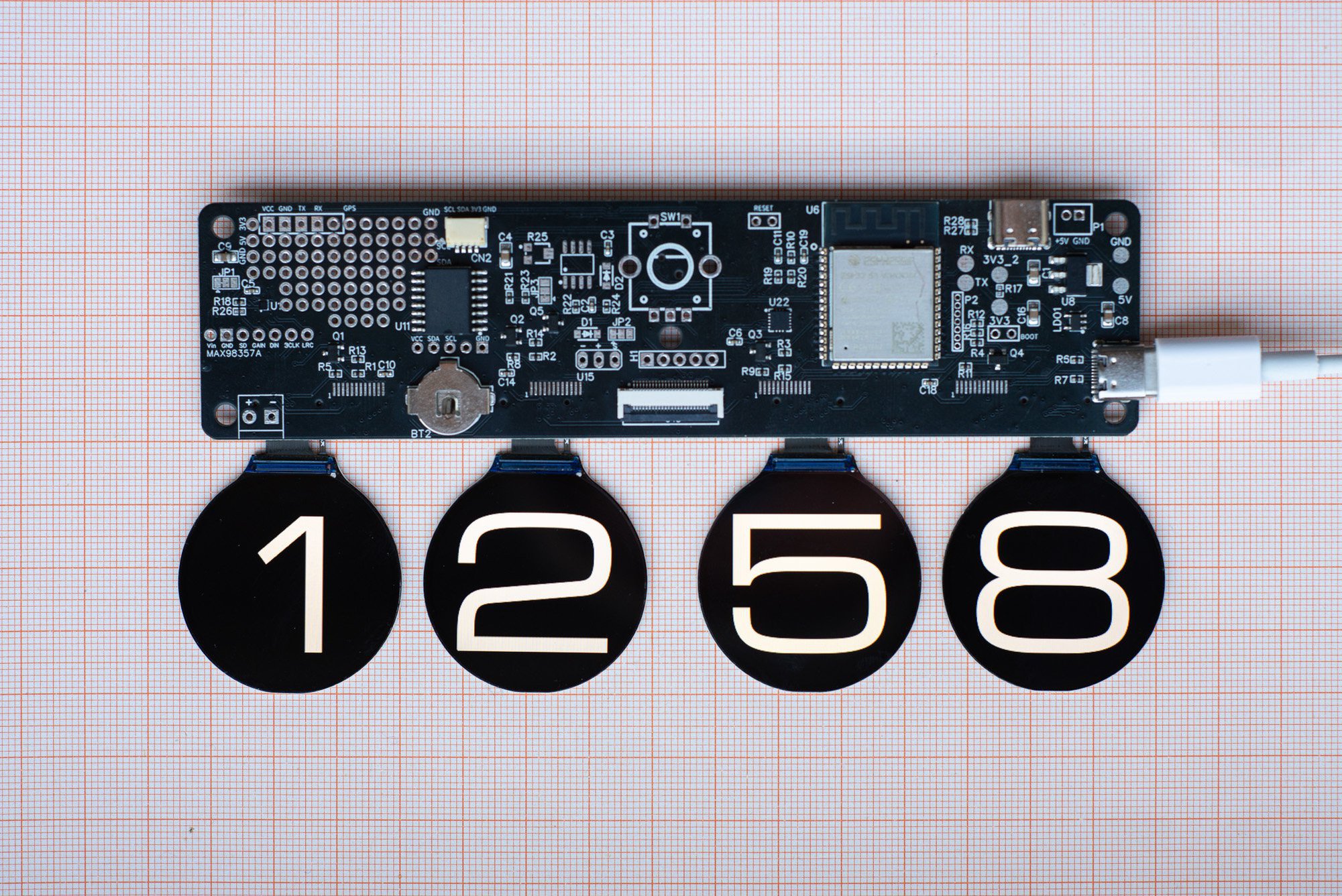SPOKE is a Raspberry Pi RP2040-based capacitive touch sensor board for interactive computer interfaces. It is designed to simplify the integration of touch-based control into various projects. SPOKE features up to 27 sensor inputs and can “turn almost any conductive material into a sensor” to control almost any computer input. Potential applications include music making, video game controlling, typing, and general software controlling. The board was designed by Tom Fox, an educator, maker, and musician in the UK. According to him, the board is accessible to beginners getting started with touch sensing while retaining enough power and customizability for professional use. It works with several conductive materials, including copper pipes, conductive paint, aluminum foil, pencils, conductive filaments, fruits, fabrics with conductive threads, and metallic surfaces. It can also be used with a non-conductive material (such as plywood) if a conductive material (e.g. tinfoil) is behind it. The fully-featured SPOKE capacitive […]
Waveshare ESP32 robotic arm kit with 5+1 DoF supports ROS2, LeRobot, and Jetson Orin NX integration
Waveshare has recently released the RoArm-M3-Pro and RoArm-M3-S, a 5+1 DOF high-torque ESP32 robotic arm kit. The main difference between the two is that the RoArm-M3-Pro features all-metal ST3235 bus servos for durability and longevity, on the other hand, the RoArm-M3-S uses standard servo motors which are less durable for long-term use. These robotic arms feature a lightweight structure, a 360° omnidirectional base, and five flexible joints, which together create a 1m workspace with a 200 grams @ 0.5m payload. A 2-DOF wrist joint enables multi-dimensional clamping and precise force control. It integrates an ESP32 MCU, supporting multiple wireless control modes via a web app, it also supports inverse kinematics for accurate positioning, curve velocity control for smooth motion, and adaptive force control. The design is open source and with ROS2 compatibility, it allows secondary development via JSON commands and ESP-NOW for multi-device communication. Compatible with the LeRobot AI framework, […]
GEEKOM A6 Review – Part 3: Ubuntu 24.04 tested on an AMD Ryzen 7 6800H mini PC
We’ve already checked out the hardware of the GEEKOM A6 mini PC with an unboxing and teardown in the first part of the review, and thoroughly tested the AMD Ryzen 7 6800H mini PC in Windows 11 Pro in the second part, so it’s now time to report our experience with Ubuntu 24.04 Linux on the mid-range mini PC. We’ve gone through features testing, system benchmarks, storage (SSD and USB) performance tests, 2.5GbE and WiFi 6 network evaluation, 4K and 8K YouTube video playback, a stress test to check out the cooling ability of the mini PC, and finally fan noise and power consumption measurements. Ubuntu 24.04 installation and system information Since we wanted to install Ubuntu 24.04.1 LTS alongside Windows 11 Pro, we resized the partition by roughly half. But since the C: drive was “BitLocker Encrypted”, we knew Ubuntu installation wouldn’t be successful that way, so we went to […]
ODROID-H3 and H4 SBCs get NetCard 3 card with four 5Gbps Ethernet ports
Hardkernl NetCard 3 is an expansion card with four 5Gbps Ethernet ports designed for the ODROID-H3 and ODROID-H4 SBCs and adding to the two 2.5GbE ports on the Intel Jasper Lake and Alder Lake-N single board computers. It follows the H2 Net Card with four 2.5GbE ports introduced in 2021 for the ODROID-H2, and tested by Ian with the ODROID-H3+ SBC in 2023. Hardkernel ended up selling more than expected, so they designed the Netcard 3 with 5GbE ports as an upgrade. It remains to be seen whether 5Gbps networking will be as popular as 2.5GbE or users will prefer moving to 10GbE hardware instead… NetCard 3 specifications: 4x 5Gbps Ethernet ports via RealTek RTL8126 5GbE controllers. M.2 edge connector with PCIe Gen3 x4 signaling Cooling with a long heatsink on RTL8126 controllers Compatible with ODROID-H3/H3+ and ODROID-H4/H4+ only, and not earlier ODROID-H2/H2+ boards You may need to flash a […]
WeAct MSPM0G3507 development board features Texas Instruments MSPM0G3507SRHBR Cortex-M0+ mixed-signal MCU
WeAct MSPM0G3507 is a BluePill-like development board equipped with Texas Instruments’ 80 MHz MSPM0G3507SRHBR Arm Cortex-M0+ mixed-signal MCU with 128KB flash and 32KB SRAM. The board features a USB-C port for power and programming, two buttons for Reset and BSL (Bootstrap Loader), a 4-pin SWD port for debugging, and two 18-pin headers for GPIOs, CAN Bus, ADC, DAC, I2C, UART, and other interfaces. The MSPM0G350x microcontroller also comes with a math accelerator for DIV, SQRT, MAC, and TRIG computations which could prove useful for control control and signal processing. WeAct MSPM0G3507 specifications: MCU – Texas Instruments MSPM0G3507 Arm Cortex-M0+ microcontroller at 80 MHz with 128KB flash, 32KB SRAM, 2x 4Msps ADC, DAC, 3x COMP, 2x OPA, CAN FD, MATHACL math accelerator USB – USB-C port for power and programming via CH340X USB to TTL chip Expansion – 2x 18-pin with power signals, I2C, SPI, GPIOs, ADC inputs, DAC, CAN Bus, […]
Orange Pi AIPro (8T) SBC features a 8 TOPS Huawei Ascend AI SoC, runs Ubuntu or openEuler
Orange Pi AIPro (8T) is a new single board computer for AI applications that features an unnamed Huawei Ascend AI quad-core 64-bit processor delivering up to 8 TOPS (INT8) of AI inference performance, although there’s also a 20 TOPS (INT8) variant of the SoC. The SBC comes with up to 16GB LPDDR4X and a 32MB SPI flash but also supports other storage options such as a microSD card, an eMMC flash module, and/or an M.2 NVMe or SATA SSD. The board also features two HDMI 2.0 ports, one MIPI DSI connector, a 3.5mm audio jack, two MIPI CSI camera interfaces, Gigabit Ethernet and WiFi 5 connectivity, a few USB ports, and a 40-pin GPIO header for expansion. Orange Pi AIPro specifications: SoC – Huawei Ascend quad-core 64-bit processor delivering up to 8 TOPS (INT8) AI performance and equipped with an unnamed 3D GPU; Likely Ascend 310B with Arm Cortex-A76 equivalent […]
QuadClock PCB – An ESP32-S3 multi-display clock controller for DIY enthusiasts
The QuadClock PCB is an ESP32-S3-powered multi-display clock controller designed to serve as a foundation for creating a four-TFT-display clock. It supports up to four 1.69-inch rectangular TFT displays (240×280) or four 1.28” round displays (240×240). It manages essential functions such as driving the displays and maintaining precise time, allowing you to focus on crafting a unique enclosure or integrating additional features. It is open-source and is powered by the ESP32-WROOM-1 module with up to 16MB flash and 2MB PSRAM. It supports independent brightness control for each mounted display via four MOSFETs and includes an onboard real-time clock with a backup battery for accurate timekeeping. The QuadClock PCB is designed for enthusiasts and makers interested in creating multi-display clock projects. It can also be used for stock tickers, weather displays, and smart home dashboards. We previously covered the 2×2 Quad Display board with either Raspberry Pi Pico W or ESP32-S3-WROOM-1 […]
CWWK X86-P6 Pocket NAS / PC features Intel N150 or Core 3 N355 CPU, four NVMe SSD sockets, dual 2.5GbE, dual HDMI 2.0
CWWK X86-P6 is a pocket-sized mini PC and NAS powered by either an Intel Processor N150 or Core 3 N355 Twin Lake processor, and equipped with four M.2 Key-M sockets slot for NVMe SSDs or AI accelerators. The Twin Lake mini PC supports up to 48GB DDR5 memory, features two 2.5GbE ports, two HDMI 2.0 video output, and two USB 3.0 ports, and can take Intel AX211 or BE200 WiFi 6/7 wireless modules. CWWK X86-P6 specifications: Twin Lake SoC (one or the other) Intel Processor N150 quad-core processor @ up to 3.6 GHz (Turbo) with 6MB cache, 24EU Intel UHD graphics @ 1.0 GHz; TDP: 6W Intel Core 3 N355 octa-core processor @ up to 3.9 GHz (Turbo) with 6MB cache, 32EU Intel UHD graphics @ 1.35 GHz; TDP: 15W System Memory – Up to 48GB DDR5 4800 MHz via SO-DIMM socket Storage – 4x M.2 M-key 2280 (PCIe 3.0 […]


